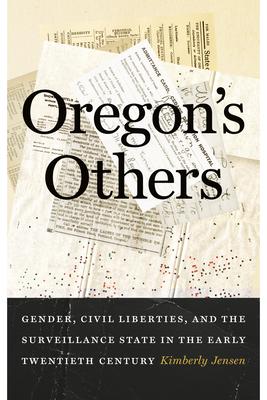Nativism, pseudoscience, and the campaign against the enemy within
In the era of the First World War and its aftermath, the quest to identify, restrict, and punish internal enemy "others," combined with eugenic thinking, severely curtailed civil liberties for many people in Oregon and the nation. In Oregon's Others, Kimberly Jensen analyzes the processes that shaped the growing surveillance state of the era and the compelling personal stories that tell its history. The exclusionary and invasive practices ranged from multiple wartime registrations for women and the registration of "enemy aliens" to the incarceration of women with sexually transmitted diseases, the use of deportations, and forced sterilization at the Oregon State Hospital and other institutions. But some Oregonians resisted the restrictions and challenges to their civil liberties. Their fierce determination to maintain their rights and freedoms fueled movements for human rights, social justice, and dissent that still reverberate today.Comprehensive and compelling, Oregon's Others examines the collision of civil liberties and persecution through the lens of gender, gender identity and presentation, ability, race, ethnicity, and class.

Oregon's Others: Gender, Civil Liberties, and the Surveillance State in the Early Twentieth Century
Nativism, pseudoscience, and the campaign against the enemy within
In the era of the First World War and its aftermath, the quest to identify, restrict, and punish internal enemy "others," combined with eugenic thinking, severely curtailed civil liberties for many people in Oregon and the nation. In Oregon's Others, Kimberly Jensen analyzes the processes that shaped the growing surveillance state of the era and the compelling personal stories that tell its history. The exclusionary and invasive practices ranged from multiple wartime registrations for women and the registration of "enemy aliens" to the incarceration of women with sexually transmitted diseases, the use of deportations, and forced sterilization at the Oregon State Hospital and other institutions. But some Oregonians resisted the restrictions and challenges to their civil liberties. Their fierce determination to maintain their rights and freedoms fueled movements for human rights, social justice, and dissent that still reverberate today.Comprehensive and compelling, Oregon's Others examines the collision of civil liberties and persecution through the lens of gender, gender identity and presentation, ability, race, ethnicity, and class.